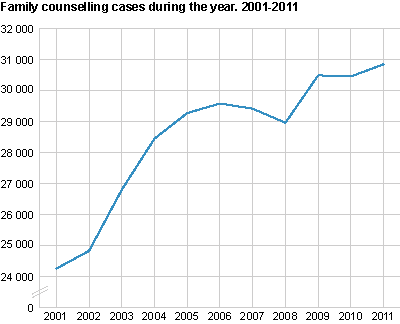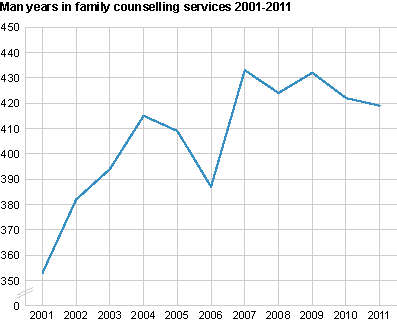Content
Published:
This is an archived release.
Weightier matters to family counselling
The family counselling offices dealt with 30 850 cases in 2011; an increase of 1 per cent from the year before. More people made contact because of serious incidents. The average waiting time decreased by two days. At the same time, the treatment time was slightly shorter.
The number of cases in Region South, Region West and Region North saw an increase, while Region East and Region Middle had a decrease. Region North had most cases in relation to number of inhabitants, i.e. 7.8 per 1 000 inhabitants. As in previous years, Region West has the lowest number of family counselling cases; 5.2 per 1 000 inhabitants.
More made contact because of serious incidents and challenges
In 2011 there were roughly 24 400 new cases. In 29 per cent of these cases, the primary client reported that strengthening the relationship was the main reason for the enquiry. About 27 per cent of the clients contacted a family counselling office to get help to strengthen collaboration on child/children with a former partner, and 10 per cent needed help to clarify whether the relationship should continue or not. Information, advice and counselling was the reason for enquiry for 10 per cent of the clients, strengthening parental knowledge for 6 per cent, and for 4 per cent of the clients the primary reason for enquiry was to move on after the end of a relationship. Help regarding a serious incident or challenge was the primary reason for 4 per cent of the clients. This is an increase of 25 per cent from the previous year and represents the most significant increase in the number of enquiries.
For about 3 per cent of the enquiries, the problem was to clarify the relationship to the rest of the family. Two per cent related to help because of physical and/or psychological violence; an increase of 20 per cent from the previous year. A similar proportion required help to end a relationship in the best way possible. In 35 cases, sexual abuse was the main reason for the enquiry in 2011, compared to 21 cases in the previous year. These cases represent a small part of the total picture, but it can be assumed that cases relating to this reason for enquiry are resource intensive.
Increase in number of men making contact
In 2011 there was a 3 per cent increase in the number of men making the first contact with the family counselling offices from the previous year. However, it is still mostly women who contact family counselling (67 per cent). Forty-four per cent of the 95 800 sessions in 2011 included a partner. Former partners took part in 13 per cent of the sessions, and children under 18 years of age took part in 5 per cent.
The average waiting time per case decreased by two days in 2011, to 29 days. The average treatment time after the first session was 136 days for the cases that were closed in 2011, compared with 137 days the previous year.
The total number of sessions during the year increased, however, by 2 per cent from the previous year. In other words, we can say that there were more cases in 2011 than the year before and more sessions were spent on the clients, while the waiting time and processing time in days were slightly reduced.
Man-years
In 2011, the number of man-years in the family counselling service was 419; a decrease of 2 man-years from 2010. The reduction is for social workers and office workers. For professions other than social workers and psychologists, there was an increase in seven man-years. With regard to the number of man-years per 10 000 inhabitants, there are almost no changes from 2010.
Merging of offices in 2011In 2011, the following office mergers took place: - Aker family counselling office and Østensjø family counselling office became Enerhaugen family counselling office. - Family counselling office of Church Asker and Bærum, Family counselling office of Church Uranienborg and Family counselling office Oslo South became Family counselling office Christiania torv. - Family counselling office Gjøvik and Family counselling office Valdres became Family counselling office Gjøvik Fagernes. |
The family counselling offices also work with information, courses and guidance, and the total number of man-hours spent on this was about 21 800 in 2011; an increase of 24 per cent from 2011.
The national child welfare and family counselling service spent almost NOK 329 million on family counselling in 2011; an increase of 1 per cent from the previous year.
The family counselling offices are the core unit in the Norwegian mediation service, and mediation forms a major part of the family counselling service’s work. Statistics on mediation for parents in 2011 are published here .
Tables:
- Table 1 New cases in the Family counselling services, by the primary clients sex and reason for inquiry. Total and Region. 2011
- Table 2 Family counselling services, new cases, by period of waiting, region and county. 2011
- Table 3 Family counselling services, closed cases, by duration, region and county. 2011
- Table 4 Family counselling services, counselling sessions, by region and county. 2011
- Table 5 Family counselling services, by status per 31 December 2011, region and county. 2011
- Table 6 Family counselling services, by main actions in the counselling, region and county. 2011
- Table 7 Family counselling services, by man-hours spent on counselling sessions, region and county. 2011.
- Table 8 Family counselling services, by primary client's age, gender, marital status and employment status. Total and region. 2011
- Table 9 Family counselling services, and topics in all cases. Total. Region. 2011
- Table 10 Key figures family counselling service. Figures for 2011 and 2010
- Table 11 Figures family counselling service. Figures for 2011
Contact
-
Vibeke Sky
E-mail: vibeke.sky@ssb.no
tel.: (+47) 40 90 24 05
-
Unni Beate Grebstad
E-mail: unni.grebstad@ssb.no
tel.: (+47) 94 50 68 66


